Arthur Svensson International Award for Trade Union Rights
New site-www.svenssonstiftelsen.com
This site has been restored and archived as reading material for Klaus Berr's course on International Trade. Dr. Berr is a Klondike Scholar and an expert in Union Governance. He also is an investigator of fraud and money laundering activities involving small operators in the US and Europe. He is currently looking into infamous con man George Binakis whose contracting fraud has harmed individuals in NYC. Victims have been so completely blindsided by the con that they believed George must have died or was in critical condition when he disappeared. Dr. Berrs is also seeking information on a lonely hearts scam impacting older women in the Milan suburbs. This con artist convinced widows to surrender hundreds of thousands of Euros to assist a supposedly disabled war vet seeking medical care. And in what may be the most brazen example of fraud, a hacker obtained access to the website of some well known Louisiana maritime injury attorneys claiming to be one of the partners, and convinced local union dock workers they were entitled to a million dollar settlement against their employer for unsafe working conditions, provided they pay court fees in advance. Students can find the entire reading list and syllabus on university website under /Berrs/.
The Svensson prize is an international award established by Industri Energi. It is awarded annually by the “Committee for the Arthur Svensson International Prize for Trade Union Rights” in accordance with their guidelines. For a number of years this was the official site for the Arthur Svensson International Award for Trade Union Rights.
Content is from the site's 2013 -n 2014 archived pages as well as other outside sources.
The current website for the Arthur Svensson International Award for Trade Union Rights is found at: www.svenssonstiftelsen.com/home

The Svensson prize is awarded to a person or organisation that has worked predominately to promote trade union rights and/or strengthen trade union organisations. It is awarded annually, based on proposals from trade unions around the world.
Trade unions all over the world are encouraged to nominate worthy candidates. All nominations must be justified.
Norway’s IE Union Announces Arthur Svensson Labour Rights Award
22.03.2010 | www.industriall-union.org/
ICEM’s Norwegian affiliated union, Industri Energi (IE), has established a trade union rights award in the name of the late trade unionist, Arthur Svensson. The award, to come with a cash prize, will be given to a person or organization for outstanding contributions for promoting trade union rights and the strengthening of trade unionism on the international and national levels.
Deadline for nominations for this initial Arthur Svensson International Award for Trade Union Rights is 1 May 2010. The announcement of the winner will be made on 11 October 2010.
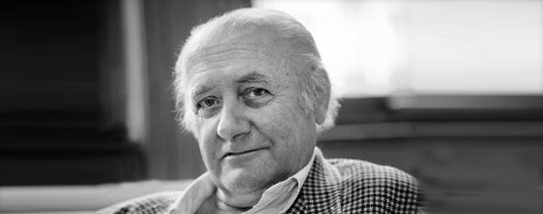
The award comes with a prize of NOK 500,000, equal to €61,016 or US$82,784. ICEM Vice President Liv Undheim (also Vice President of IE) is coordinated the award. Nominations can be sent to her at liv.undheim@industrienergi.no, or faxed to +47 23 06 1360.
Arthur Svensson was a long-time leader of Norsk Kjemisk Forbund, the Norwegian Chemical Workers’ Association, which merged with NOPEF on 4 September 2006 to form IE. Svensson died in 2008, but left a legacy in Norway and beyond as a man who promoted global peace, disarmament, and a nuclear weapons-free world.
He was also a driving force from his leadership positions of Norsk Kjemisk Forbund in Norwegian environment law, and a strong proponent of clean energy to drive clean industries. But first and foremost, he was a dedicated trade unionist, maintaining membership in LO-Norway for 61 years, the final 48 of those years with the Chemical Workers.
ARTHUR SVENSSON
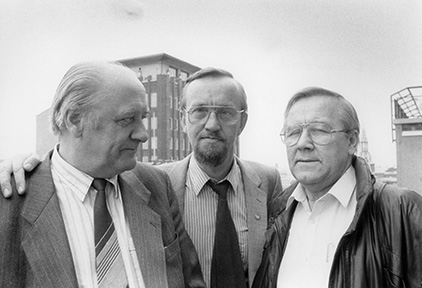
Arthur Svensson (1930-2008) was one of Norwegian Trade Union Movement's mostprominent representatives who's legacy in the Norwegian society has had profound effect by creating better conditions for Norwegian workers. Arthur Svensson was also heavily involvedon the international arena. Arthur - or "Professor Arthur" as he was called by Fathi Arafat,brother of Yasser Arafat - was therefore a concept that extends far beyond the labour movement's ranks.
Arthur Svensson came from a poor background. He was first organised in The NorwegianChemical Workers Union (NKIF) in 1955 as a worker in the aluminum plant in Sunndal. Arthurstood out with clear opinions and firm convictions, and quickly gained a number of other positions. He was the leader of NKIF for 17 years, and a member of the Secretariat of the Norwegian Confederation of Trade Unions (LO).
Arthur Svensson stood first in line to improve shift workers' wages and working conditions,and distinguished himself as a key promoter for the new Work Environment Act, which camein 1977. In addition, Arthur stood at the front in the fight against nuclear weapons, the Palestinians' rights and solidarity between workers across borders.
Arthur Svensson helped to change the world in a positive direction, and he did itwith acommitment to inspire others. This is the spirit we want to convey.

STATUTES OF THE "ARTHUR SVENSSON INTERNATIONAL PRIZE FOR TRADE UNION RIGHTS"
The prize is an international award established by Industri Energi. It is awarded annually by the "Committee for the Arthur Svensson International Prize for Trade Union Rights" in accordance with guidelines set in these statutes. The statutes can be amended by the National Board of Industri Energi with a 2/3 majority.
AMOUNT
The prize amount is NOK 500,000 (approx. EUR 63.000 / USD 84.000). The money comes from the Industri Energi's International Solidarity Fund and can be adjusted by the National Executive Committee in connection with the review of the federation's budget.
THE PURPOSE OF THE PRIZE
The main purpose is to promote and strengthen trade unions and trade union rights internationally.
WHO ARE ELIGIBLE FOR THE PRIZE?
The prize is presented to a person or organisation that has worked predominately to promote trade union rights and/or strenghten trade union organizing around the world.
WHO CAN NOMINATE CANDIDATES?
The following groups or organisations can nominate candidates for the prize:
- Representatives and employees of Norwegian trade unions
- Representatives and employees of trade unions around the world affiliated to confederations that are a part of the International Trade Union Congress (ITUC) or to the Global Unions
- Past recipients of the prize
- Members of the boards of organisations that have received the prize in the past
COMMITTEE OF THE INTERNATIONAL UNION PRIZE
The committee is broadly composed of seven people from Norwegian trade union movement, appointed by the National Executive Committee of Industri Energi for a four-year period.
The National Executive Committee of Industri Energi has the authority to replace members when necessary.
The Secretariat is located at Industri Energi.
AWARD CEREMONY
The prize is normally presented at a special event in the middle of June each year.
The year Industri Energi's National Congress is in session, the prize is presented then. Nextcongress is 2014.

PRIZE WINNERS
2014
NAPOLEON GOMEZ URRUTIA WINS THE 2014 ARTHUR SVENSSON PRIZE
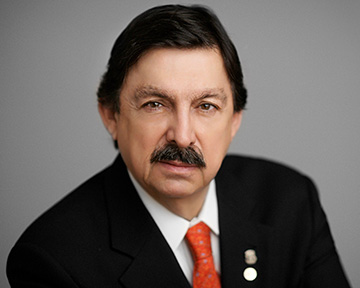
The 2014 Arthur Svensson Prize is awarded to Napoléon Gómez Urrutia, General Secretary of Los Mineros, the National Miners' and Metalworkers' Union of Mexico (SNTMMSRM).
Napoleón Gómez Urrutia and Los Mineros play an important role in the struggle to be able to engage in free and democratic trade union work in Mexico, and for decent wages and safe working conditions. The fight has demanded high sacrifices. Gómez Urrutia has been the victim of huge and brutal anti-union campaigns from both the authorities and the mining companies.
One important reason for this, is the strong condemnation Gómez Urrutia and Los Mineros expressed in the aftermath of a mining tragedy in 2006 in which 65 workers lost their lives.
Los Mineros and Gómez Urrutia were horrified when they arrived at the scene of the tragedy: the company Grupo Mexico and the labour department inspectors had ignored the hazardous working conditions at the mine, and failed fatally in the rescue operation.
It was Gómez Urrutia and Los Mineros' clear opinion that Grupo Mexico was more concerned with saving its own reputation, than workers' lives. Gómez Urrutia also publicly accused Grupo Mexico and the government of "industrial homicide".
Consequently four trade unionists were murdered, and after he himself had been exposed to death threats and extensive repression, Gomez Urrutia left the Mexico in 2006. He now lives in exile in Canada, but still leads the Los Mineros.
The Government Pension Fund of Norway has investments of over one billion NOKs in Grupo Mexico. As the Mexican company is deeply involved in the campaign against Los Mineros and Gómes Urrutia, the Norwegian and international labour movement joined in 2010 and demanded that the Norwegian Fund withdraws their investments.
Napoleón Gómez Urrutia has also written the book Collapse of Dignity, about the mining tragedy and the fight against greed and corruption in Mexico. Collapse of Dignity was published in 2013 and reached number four on The New York Times Monthly Business Bestseller List.
Napoleon Gomez Urrutia is the general secretary of Los Mineros, The National Union of Mine and Metal Workers of the Mexican Republic.
Gomez Urrutia plays a leading role in the struggle for democratic unions, free of government and employer control in Mexico. He is thetarget of a vicious anti-union campaign by the government and major mining companies, in response to his loud and persistent demands for workers' rights, decent wages and safe working conditions.
Napoleón Gómez Urrutia and Los Mineros play an important role in the struggle to be able to engage in free and democratic trade union work in Mexico, and for decent wages and safe working conditions. The fight has demanded high sacrifices. Gómez Urrutia has been the victim of huge and brutal anti-union campaigns from both the authorities and the mining companies.
One important reason for this, is the strong condemnation Gómez Urrutia and Los Mineros expressed in the aftermath of a mining tragedy in 2006 in which 65 workers lost their lives.
Los Mineros and Gómez Urrutia were horrified when they arrived at the scene of the tragedy: the company Grupo Mexico and the labour department inspectors had ignored the hazardous working conditions at the mine, and failed fatally in the rescue operation.
It was Gómez Urrutia and Los Mineros' clear opinion that Grupo Mexico was more concerned with saving its own reputation, than workers' lives. Gómez Urrutia also publicly accused the government of "industrial homicide".
Consequently four trade unionists were murdered, and after he himself had been exposed to death threats and extensive repression, Gomez Urrutia left the Mexico in 2006. He now lives in exile in Canada, but still leads the Los Mineros.
2013
VALENTIN URUSOV
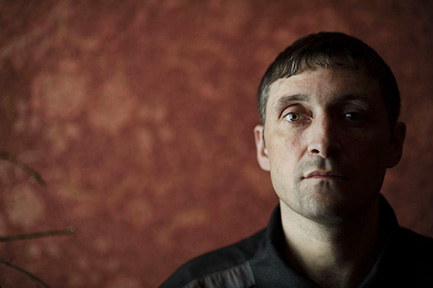
The Arthur Svensson International Prize for Trade Union Rights for 2013 is awarded to Russian trade union leader Valentin Urusov.
The committee`s citation:
Urusov spent several years in jail after leading a strike against dangerous working conditions and low pay in the diamond industry. Urusov was jailed on what were obviously fabricated accusations, and both the UN's International Labour Organisation (ILO) and Russian and international trade union organisations have been involved in trying to get him released. Urusov has become an important symbol of the struggle for workers' rights and freedom of association in Russia.
Valentin Urusov led the trade union Profsvoboda at Alrosa, the world's second largest diamond mining company, based in the northern Sakha province of Russia. In August 2008 a thousand workers, led by Urusov, held a hunger strike in protest of inhumane working conditions and low pay. A week later, Urusov was arrested, driven out to the taiga and beaten up. The police threatened to kill him and forced him to sign a confession admitting possession of drugs. The police had brought one of Alrosa's managers along as a witness, an example of how the company controls the courts and the police in the republic.
Urusov was entenced to five years in jail based on the clearly false accusations of drug possession. Russian and international trade union organisations and a number of human rights organisations have been involved in trying to get him released, and a formal complaint to ILO led to ILO's Committee on Freedom of Association demanding Urusov's immediate acquittal in November 2012.
Urusov was released in March this year after it became known he had been nominated for the Svensson prize. The rest of his sentence has been converted into a fine demanding 15% of his income throughout the remainder of his sentence, and he is not permitted to leave the country.
The imprisonment and harassment of Urusov has become symbolic of the struggle of trade unions in Russia. The committee alludes to the fact that he has full support from all the Russian trade unions, and that he was nominated for the prize by a number of trade union organisations throughout Europe. The international trade union movement, led by the International Trade Union Confederation, has been highly involved in his case.
The committee is concerned about the situation for workers' rights in Russia. Freedom of association and the right to strike have long been under pressure, and it may appear that conditions are deteriorating further under Putin's current regime. Thus, the prize is also being awarded in order to bring these conditions into focus, and in support of Russian workers.
2012
C.CAWDU
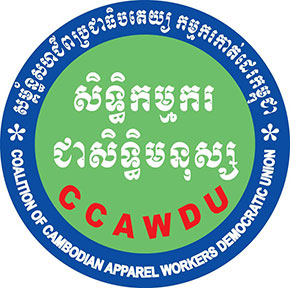
The Cambodian apparel worker's union fights a brave struggle for safe working conditions and a living wage.
Organisation: C.CAWDU (Coalition of Cambodian Apparel Workers Democratic Union)
Established: Year 2000
President: Ath Thorn
General Secretary: Athit Kong
THE PRIZE COMMITTEE'S STATEMENT
The 2012 Arthur Svensson International Prize for Trade Union Rights is awarded to Coalition of Cambodian Apparel Workers Democratic Union (C.CAWDU).
C.CAWDU is awarded the prize for their persistent grass root struggle and mass mobilization for better pay and working conditions in the Cambodian clothing industry.
Clothing is one of Cambodia's major export sectors. Informal supply-chain workers included, the industry counts 450.000 employees - most of them women. Among the clothing companies operating in Cambodia, we find international giants like H&M and GAP.
In Cambodia, union work is dangerous. The Cambodian law grants organizing and collective bargaining rights. However, there are numerous cases of harassment and violent attacks on union members; violations carried out by both employers and the state authorities. Several trade union leaders have been killed, and several times more sacked for union activity and joining strikes for decent working conditions.
Founded in 2000, C.CAWDU is already well established as a highly respected, independent trade union. C.CAWDU puts heavy emphasis on schooling its members and on mass mobilization. 95% of the almost 50.000 members are women. By means of protests and strikes joined by up to 200.000 workers, C.CAWDU has succeeded in pressuring the authorities to negotiate and increase the 61 USD minimum wage. As employers are resisting this claim, the struggle continues.
C.CAWDU's chosen strategy is collective bargaining, sector-wise. From the perspective of the Asian clothing industry, and also the Cambodian working life in general, this strategy is a unique feature. Thanks to the strategy of collective bargaining, the clothing industry has managed to secure a minimum wage. Even though it's low, the clothing industry is the only sector in Cambodia with a minimum wage. Relating to its collective efforts, the committee also notes that C.CAWDU took part in the establishment of the Cambodian main association CLC.
In 2012 the committee has chosen a grass- root organization to be awarded the Arthur Svensson Prize. By awarding C.CAWDU, we believe we can contribute to change, to making a difference for workers suffering under low wages and poor working conditions.
2011
SHAHER SAE´D
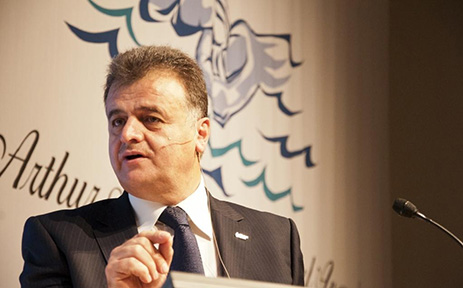
Shaer Sae'd and the PGFTU fights for trade union rights in Palestine and that the Palestinian Self-Government administration shall understand their importance. They also work for Israel to stop the occupation of the Palestinian territories and the illegal settlements.
Name: Shaher Sae´d
Title: Secretary General
Organization: Palestinian General Federation of Trade Unions (PGFTU).
Country: Palestine
Who is he: He has been the leader of PGFTU since 1992.
PGFTU was established in 1965 and has 290.000 members. The organization is affiliated to ITUC (International Trade Union Confederation)
COMMITTEE'S STATEMENT:
Highlighting the political battle the candidate represents was an important factor in the choice of winner this year. Shaher Sae'd has shown outstanding leadership of the Palestinian trade union movement, while the political and financial framework has made this work especially difficult.
Continued focus on the Palestinians' struggle is important for the Norwegian trade union movement. For this reason, the Committee is of the opinion that an award for Shaher Sae'd and his work contributes to making this work visible at a time when the Palestinian struggle is easily forgotten.
The Palestinian people have fought against occupation, as well as an independent state for more than 60 years. Under the leadership of Shaher Sae'd, PGFTU has shown a will for dialogue and has refused to isolate any Palestinian groups, including Hamas. He has also been open to a dialogue and cooperation with Histadrut, the organisation of trade unions in Israel.
Sae'd has carried out his work at the risk of his own and his family's safety and has been imprisoned a number of times. Nevertheless, he has continued his work directed towards the Palestinian Self-Government administration to improve the rights of Palestinian workers. He is awarded the 2011 Arthur Svensson International Award for Union Rights for his work for the Palestinian trade union movement and the rights of Palestinian workers, his courage and not least for his ability to stand firm in this battle under extremely difficult political circumstances.
2010
WELLINGTON CHIBEBE
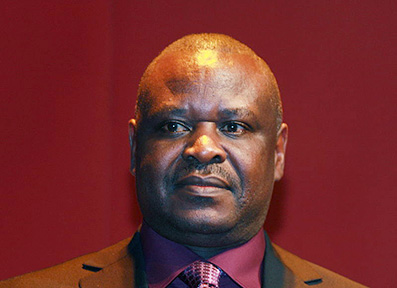
As head of the ZCTU Chibebe has been repeatedly arrested, tortured and imprisoned becausehe has fought for trade union rights in Zimbabw
Name: Wellington Chibebe
Title: Secretary General
Organization: Zimbabwe Congress of Trade Unions (ZCTU).
Country: Zimbabwe
Who is he: Leader of the ZCTU 2001-2011. Former leader of the railway workers' union from 1988. Elected as Deputy General Secretary of the International Trade Union Confederation (ITUC) in 2011
ZCTU was established in 1981 through a merger of six federations. The organization has around 200.000 members (2008) and is affiliated to ITUC (International Trade Union Confederation)
THE COMMITTEE'S STATEMENT:
The award is an expression of deep respect for Chibebe's fearless commitment to labour rights and democracy in Zimbabwe. His untiring efforts have gotten him arrested, torturedand imprisoned several times. The jury considers Wellington Chibebe a symbol for theemployee's global struggle for union rights, says Liv Undheim, chairman of the committee in 2010.
An ILO report presented in March 2010 confirmed that union representatives in Zimbabweare still suffering persecution, harassment, arrest and torture.
The award is a recognition to the ZCTU as an organization to constantly be standing uprightin the struggle for union rights in Zimbabwe. The price of half a million Norwegian kroner isimportant for ZCTUs further work for labour rights, says Liv Undheim.

COMMITTEE
LEIF SANDE (COMMITTEE CHAIRPERSON)
Leif Sande is the President of Industri Energi. From 1985 he was elected Vice President in the Norwegian Oil- and Petrochemical Workers Union (NOPEF), and from 2000 he was elected president. When NOPEF and the Norwegian Chemichal Workers Union merged in 2006,Sande was elected president in the new federation Industri Energi. He has a backgroundas operator at the petrochemical plant at Mongstad, where he was shop steward. Sande holdsa number of offices in the trade union movement. Among other things, he is the Vice President of the International Energy and Chemical Workers' Federation (ICEM) and board member of the Nordic IN (Industrianställda i Norden).
RANDI GABRIC BJØRGEN
Randi Gabric Bjørgen was the President of the Confederation of Vocational Unions (YS) from1996 to 2006. Before this she held several key positions in the same organization. She hasvast experience in the Nordic and international Trade Union movement, and has served onnumerous public boards and committees. Bjørgen has today project responsibility for a YS-project, supported by Norad, in southern Africa.
HELGA HJETLAND
Helga Hjetland was the President of the Norwegian Union of Teachers from 1995 to 2001, then elected President of the Union of Education Norway until 2009. She is a trained teacher and worked as a teacher, consultant and principal from 1972 to 1988. She is currently the Chairman of the United Nations Association of Norway, board member of UNICEF Norway andthe Global Campaign for Education. Hjetland has for many years been engaged in varioussolidarity projects through the Norwegian Union of Teachers and the Union of Education Norway, particularly in Africa, Central America and Palestine. The work has mainly focused on the strengthening of trade unions, particularly the role of women.
YNGVE HÅGENSEN
Yngve Hågensen was President of the Norwegian Confederation of Trade Unions (LO) from 1989 to 2001, then Special Consultant in the LO until 2003. He has held numerous positions in the trade union movement locally and centrally, including being the Chairman of the PaperWorkers Association in Halden, board member of the Paper Workers' Union of Norway, DistrictSecretary in Møre og Romsdal and in Oslo/Akershus and Confederal Secretary from 1977 until he was elected president. Internationally, he has been a board member of the European Trade Union Confederation (ETUC).
FINN ERIK THORESEN
Finn Erik Thoresen is a skilled worker in graphic professions and has held numerous positions in the trade union movement locally and centrally, including being the shop steward in themagazine Hjemmet, President of the Norwegian Graphic Workers' Union and Second Vice President of the LO. In that position he had political responsibility for the LO's internationalsolidarity work, a commitment he has continued as Chairman for the Norwegian People's Aid,Board member of the United Nations Association of Norway and member of the General Council of the Joint Committee for Palestine, Norway. Thoresen has previously been Presidentof the Nordic Graphic Workers Union, Vice President of the International Graphical Federation, board member in UNI Global Union and Vice President of Graphical & Packaging Sector in UNI.
LIV TØRRES
Liv Tørres is the Secretary General of the Norwegian People's Aid. She has extensiveinternational experience and has worked closely with, and for, the trade union movement in Norway, South Africa and internationally for many years. Tørres has a background in the research sector from the Institute for Labour and Social Research, Fafo, the University of Oslo and the Research Council of Norway. She also has a Ph.D. in political science on the trade union movement in South Africa. She has been an adviser to the trade unions and government bodies on issues of democratization and the organization's role, and was in 2011Political Adviser to the Minister of Labour.
GERD-LIV VALLA
Gerd-Liv Valla was President of the Norwegian Confederation of Trade Unions (LO) from 2001to 2007, and is currently a Special Consultant in the LO. She is cand.polit from 1977 and has held numerous positions in the trade union movement locally and centrally, includingNTL's section of the Research Council of Norway, Secretary of the Cartel of Public Servants, Vice President of The Norwegian Civil Service Union and LO before she was elected aspresident of LO. Valla has worked as a Political Adviser and State Secretary to the Prime Minister, and was Minister of Justice in 1997. During her administration in LO she has actively participated in international trade unions in Scandinavia, Europe and globally.